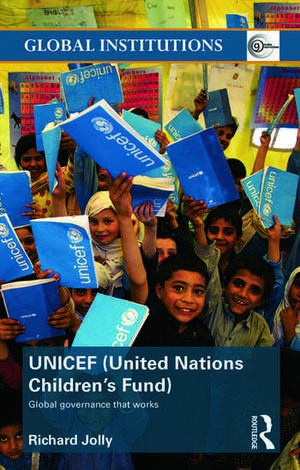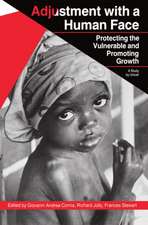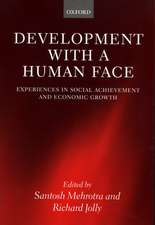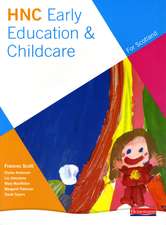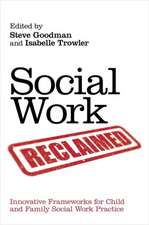UNICEF (United Nations Children's Fund): Global Governance That Works: Global Institutions
Autor Richard Jollyen Limba Engleză Paperback – 27 mar 2014
UNICEF is one of the best known organizations of the United Nations system and the oldest of the UN’s development funds. It is also the part of the UN which consistently receives support from all countries round the world, including the United States. This book brings out the wider reasons for UNICEF’s success and popularity, setting them in the context of UNICEF’s evolution since 1946 and drawing lessons for other international organizations. The book argues that, despite its problems, international action for children, built substantially on non-economic foundations, is not only possible, but can be highly successful in mobilizing support, producing results and making a difference to the lives of millions of children.
This will be of great interest to all scholars of international organisations, development, human rights and the United Nations system.
| Toate formatele și edițiile | Preț | Express |
|---|---|---|
| Paperback (1) | 363.20 lei 6-8 săpt. | |
| Taylor & Francis – 27 mar 2014 | 363.20 lei 6-8 săpt. | |
| Hardback (1) | 998.40 lei 6-8 săpt. | |
| Taylor & Francis – 26 mar 2014 | 998.40 lei 6-8 săpt. |
Din seria Global Institutions
-
 Preț: 286.43 lei
Preț: 286.43 lei -
 Preț: 346.55 lei
Preț: 346.55 lei -
 Preț: 303.17 lei
Preț: 303.17 lei -
 Preț: 279.80 lei
Preț: 279.80 lei -
 Preț: 279.88 lei
Preț: 279.88 lei -
 Preț: 316.56 lei
Preț: 316.56 lei -
 Preț: 326.01 lei
Preț: 326.01 lei -
 Preț: 271.41 lei
Preț: 271.41 lei -
 Preț: 310.65 lei
Preț: 310.65 lei -
 Preț: 301.40 lei
Preț: 301.40 lei -
 Preț: 294.01 lei
Preț: 294.01 lei -
 Preț: 365.03 lei
Preț: 365.03 lei -
 Preț: 306.81 lei
Preț: 306.81 lei -
 Preț: 326.36 lei
Preț: 326.36 lei -
 Preț: 356.46 lei
Preț: 356.46 lei -
 Preț: 188.80 lei
Preț: 188.80 lei -
 Preț: 345.89 lei
Preț: 345.89 lei -
 Preț: 363.25 lei
Preț: 363.25 lei - 18%
 Preț: 1001.55 lei
Preț: 1001.55 lei - 26%
 Preț: 761.76 lei
Preț: 761.76 lei - 18%
 Preț: 999.82 lei
Preț: 999.82 lei -
 Preț: 447.90 lei
Preț: 447.90 lei -
 Preț: 384.16 lei
Preț: 384.16 lei -
 Preț: 440.69 lei
Preț: 440.69 lei -
 Preț: 369.18 lei
Preț: 369.18 lei -
 Preț: 368.90 lei
Preț: 368.90 lei -
 Preț: 345.89 lei
Preț: 345.89 lei -
 Preț: 360.10 lei
Preț: 360.10 lei - 18%
 Preț: 998.71 lei
Preț: 998.71 lei - 18%
 Preț: 1113.25 lei
Preț: 1113.25 lei -
 Preț: 358.84 lei
Preț: 358.84 lei - 17%
 Preț: 246.93 lei
Preț: 246.93 lei - 18%
 Preț: 1160.47 lei
Preț: 1160.47 lei - 18%
 Preț: 1052.38 lei
Preț: 1052.38 lei -
 Preț: 381.03 lei
Preț: 381.03 lei -
 Preț: 364.51 lei
Preț: 364.51 lei - 28%
 Preț: 819.48 lei
Preț: 819.48 lei - 18%
 Preț: 1106.36 lei
Preț: 1106.36 lei - 18%
 Preț: 999.46 lei
Preț: 999.46 lei
Preț: 363.20 lei
Nou
Puncte Express: 545
Preț estimativ în valută:
69.50€ • 72.57$ • 57.39£
69.50€ • 72.57$ • 57.39£
Carte tipărită la comandă
Livrare economică 15-29 aprilie
Preluare comenzi: 021 569.72.76
Specificații
ISBN-13: 9780415491174
ISBN-10: 0415491177
Pagini: 216
Ilustrații: 3
Dimensiuni: 138 x 216 x 15 mm
Greutate: 0.3 kg
Ediția:1
Editura: Taylor & Francis
Colecția Routledge
Seria Global Institutions
Locul publicării:Oxford, United Kingdom
ISBN-10: 0415491177
Pagini: 216
Ilustrații: 3
Dimensiuni: 138 x 216 x 15 mm
Greutate: 0.3 kg
Ediția:1
Editura: Taylor & Francis
Colecția Routledge
Seria Global Institutions
Locul publicării:Oxford, United Kingdom
Public țintă
General, Postgraduate, and UndergraduateCuprins
Chapter 1 The vision of two early giants, 1946-60, Chapter 2 Planning for children and the role of economists, 1960-70, Chapter 3 "Basic services" and "health for all," 1970-80, Chapter 4 The Jim Grant years, 1980-95, Chapter 5 Nutrition, WASH, education, and "children in difficult circumstances", Chapter 6 The human rights-based approach, 1995-2010, Chapter 7 UNICEF today, Chapter 8 Conclusions for global governance and the UN
Recenzii
Moved and led by the visionary Jim Grant, UNICEF has been one of the biggest contributors to a better world, as well as a pioneer in making us understand how social change has to be assessed and evaluated, and what can be practically done to accomplish what most people thought could not be achieved. This book, by one of the leading players in UNICEF’s efforts and attainments, is a gripping account of firm-footed progress in a world of adversity. This is a success story that deserves to be known, partly for further and continued progress in the lives of children as well as adults everywhere, but also as a definitive challenge to premature - but widespread - pessimism about the pursuit of the global good. Amartya Sen is Thomas W. Lamont University Professor, and Professor of Economics and Philosophy at Harvard University.
Richard Jolly is both passionate advocate and careful analyst of UNICEF. He was part of its leadership during its years of world changing glory under Jim Grant and then academic observer of a later UNICEF that has operated in harder times. In this highly readable volume, Jolly explores the lessons for leadership in the UN and powerfully calls for applying these lessons for humane global governance in the wider world."
Mark Malloch-Brown, former UN Deputy Secretary-General.
Richard Jolly is both passionate advocate and careful analyst of UNICEF. He was part of its leadership during its years of world changing glory under Jim Grant and then academic observer of a later UNICEF that has operated in harder times. In this highly readable volume, Jolly explores the lessons for leadership in the UN and powerfully calls for applying these lessons for humane global governance in the wider world."
Mark Malloch-Brown, former UN Deputy Secretary-General.
Descriere
UNICEF is one of the best known organizations of the United Nations system and the oldest of the UN’s development funds. It is also the part of the UN which consistently receives support from all countries round the world, including the United States. This book brings out the wider reasons for UNICEF’s success and popularity, setting them in the context of UNICEF’s evolution since 1946 and drawing lessons for other international organizations. This will be of great interest to all scholars of international organisations, development, human rights and the United Nations system.
